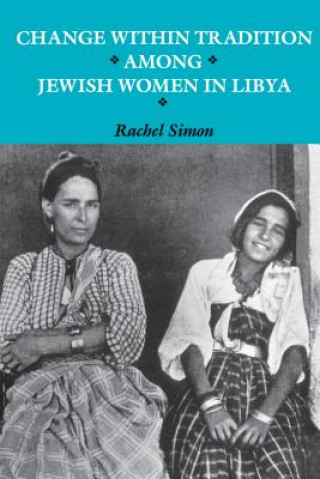
Dostawa
Doradca ds. zakupów
16 125 881 książek w 175 językach







Pokaż wszystkie języki (175)





Jednak się nie przyda? Nic nie szkodzi! U nas możesz zwrócić towar do 30 dni
 Bon prezentowy
O dowolnej wartości
Bon prezentowy
O dowolnej wartości
Bon prezentowy to zawsze dobry pomysł. Obdarowany może za bon prezentowy wybrać cokolwiek z naszej oferty.
Change within Tradition among Jewish Women in Libya
 Angielski
Angielski
 178 b
178 b
30 dni na zwrot towaru
Mogłoby Cię także zainteresować


In the first major study of women in an Arab country's Jewish community, Rachel Simon examines the changing status of Jewish women in Libya from the second half of the nineteenth century until 1967, when most Jews left the country. Simon shows how social, economic, and political changes in Libyan society as a whole affected its Jewish minority and analyzes the developments in women's social position, family life, work, education, and participation in public life. Jews lived in Libya for more than two thousand years. As a result of their isolation from other Jewish centres and their extended coexistence with Berber and Arab Muslims, the Jews of Libya were strongly influenced by the manners, customs, regulations, and beliefs of the Muslim majority. The late nineteenth century witnessed a growing European cultural and economic penetration of Ottoman Liibya, which increased after the Italian occupation of Libya in 1911. Italian rule continued until a British Military Administration was established in 1942-43. Libya became independent in late 1951. The changing political regimes presented the Jewish minority with different models of social and cultural behavior. These changes in the foci of inspiration and imitation had significant implications for the position of Jewish women, as Jewish traditional society was exposed to modernizing and Westernizing influences. Economic factors had a strong impact on the position of women. Because of recurring economic crises in the late nineteenth century, Jewish families became willing to allow women to work outside the home. Some families also allowed their daughters to pursue vocational training and thus exposed them also to academic studies, especially at schools operated by representatives of European Jewish organizations. Although economic and educational opportunities for women increased, the Jewish community as a whole remained traditional in its social structure, worldview, and approach to interpersonal relations. The principles upon which the community operated did not change drastically, and the male power structure did not alter in either the private or the public domain. Thus the position of women changed little within these spheres, despite the expansion of opportunities for women in education and economic life. Change was slow, evolutionary, and within the framework of traditional society.
Informacje o książce
 Angielski
Angielski
Kategoria




 Jak kupować
Jak kupować
















